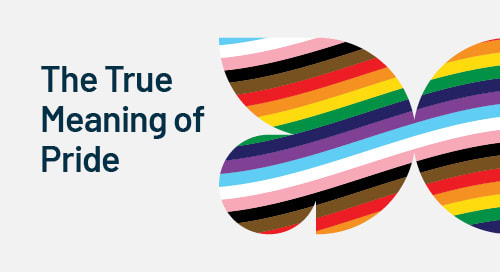The True Meaning of Pride
 Many years ago, a friend of a friend who was a weekend guest was sitting on my deck flipping through a news magazine. As I walked past him, I heard him mutter something under his breath. I glanced down to see he was looking at pictures of a Pride parade. He looked up and, with a sneer, said, “What is there to be so proud of?”
Many years ago, a friend of a friend who was a weekend guest was sitting on my deck flipping through a news magazine. As I walked past him, I heard him mutter something under his breath. I glanced down to see he was looking at pictures of a Pride parade. He looked up and, with a sneer, said, “What is there to be so proud of?”
His comment stunned me. I couldn’t think of a response that didn’t involve asking him to leave, so I went inside to check on dinner. It was a perfect example of how easy it is to assume that everyone who seems perfectly pleasant shares your worldview.
I managed to remain civil through dinner, but it took effort. I didn’t sleep much that night. My mind was buzzing with clever comebacks. But eventually, I realized I didn’t want a snappy retort. I wanted to say something that might actually bridge the gap in understanding between us.
The next day, our group went for a hike. When I found myself walking beside him, I seized the moment. I respectfully asked if we could talk about what he’d said the night before. He looked blank—he didn’t even remember his remark. He had no idea how wide my eyes had gotten or how sharply my eyebrows had risen.
I explained that my daughter, who had helped prepare the beautiful dinner and with whom he’d had lovely conversation, was gay and had marched in many Pride parades. He had the grace to look embarrassed.
I told him that he might be interpreting the word pride in the way it’s often used negatively—what some call “dark” pride: hubris, arrogance, or an inflated sense of superiority. But in the context of the LGBTQIA+ community, Pride means something very different. It means the reclaiming of dignity. It’s a healthy sense of self-worth—the opposite of shame or self-loathing.
We talked about the long history of how LGBTQIA+ individuals have been marginalized, shamed, imprisoned, or institutionalized. Pride celebrations are a defiant, joyful response to that painful history. They are a declaration of the right to exist, to be seen, and to be loved as oneself.
I shared that having worked in theatre (where many LGBTQIA+ folks have found family after being banished from their family of origin) for many years, and having a Queer daughter, shaped my perspective. Her character is unimpeachable. Her sexual orientation isn’t a choice, it’s simply how she came into this world. All I’ve ever wanted for her is what most of us long for: romantic passion, companionship, and a love that lasts a lifetime. Why should she feel shame for that?
I even asked him to consider whether someone he loves might be gay, and too afraid to tell him. I could see him pause, the wheels turning.
Research shows that humans often struggle to feel empathy for those outside their perceived group—whether the difference is racial, cultural, economic, or related to gender or sexuality. Group identity shapes our emotional and moral instincts, and reshaping those responses takes serious reflection and intentional effort.
All major spiritual traditions, the Bible, the Qur’an, the Torah, urge us to show compassion. Kindness and care for others are fundamental values. So how does that square with wishing others to feel shame?
Shame is soul-crushing. I know because I experienced it as a child—for being too loud, for struggling with math, for asking too many questions, for having too big an appetite. I learned quickly how to behave to avoid shame. But I didn’t have to deny who I was at my core. I’m not sure anyone can truly do that.
To his credit, our guest did reflect. Over time, he came to see that his judgment had been a knee-jerk reaction based on limited experience. He’s now a friend.
So what does it cost us to broaden our perspective? To extend compassion to those who mean us no harm?
This, to me, is the true meaning of Pride.
